[Original by Yoriko YAMAMURA, Palestine Project (December 20, 2018); Translated by M. Takahashi/S. Altman]
Hello, everyone. It’s been cold in Jerusalem. There are many houses built on stones here. We feel colder inside of a house than outside. This time I am going to tell you about a school in East Jerusalem that we visited under our project.
We visited the Hassan Al-Thani School located close to the old town in East Jerusalem. Together with our partner organization, the Palestinian Medical Relief Society (PMRS), we provide various kinds of training for the students of the school health committee. The students work with local residents in order to solve problems in the community by using a small fund.
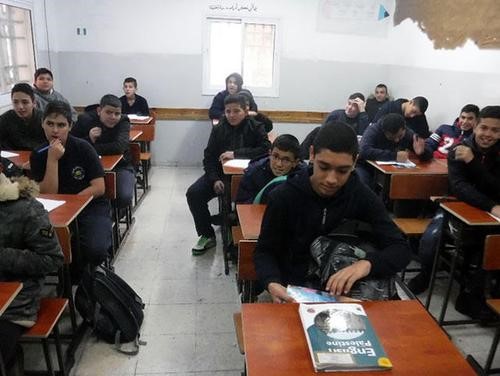
Students study with new desks and chairs.
One of the current problems in the school is the broken desks and chairs they use. We bought new ones and fixed broken ones in the classrooms of upper grade students from seventh to ninth grade, which corresponds to middle school students in Japan. With the help of the school health committee and the teacher who coordinates the collaboration of PMRS and the committee, a carpenter who is the father of a student procured some materials and painted the furniture brown. Although we didn’t have enough money to fix desks and chairs of other three classes, it seemed that their learning environment got better than before.
When we asked the students how they felt using fixed chairs and desks, they answered:
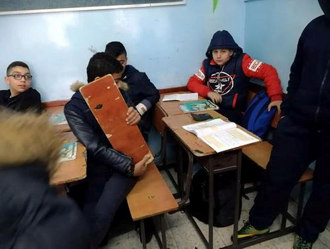
The back of a chair was also broken in the classroom where we haven’t started fixing.
“We were sad because the furniture tore my clothes and books. They were wobbling. But now they look nice and don’t hurt us anymore. We are glad.”
“The old desks and chairs tore our clothes and books but they don’t anymore.”
“I feel like studying more now.”
“The old desks and chairs hurt our hands and tore exam papers, too.“
“The desks were shaky so I couldn’t concentrate on studying.”
“I feel relaxed now.”
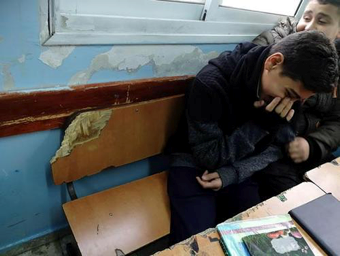
The students of lower grades have to keep using broken chairs because we don’t have enough funds.
The students gave us those positive comments on their new learning environment.
Asmaa, the health nurse of PMRS working for the school, said that she wanted the chairs and desks to be used for a long time. She looked quiet, but she was very dedicated when she gave nutrition lessons. We found her deep passion for children.
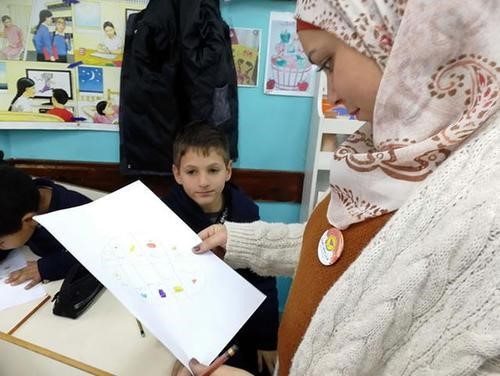
Asmaa watches pictures of healthy breakfast that the students of lower grades drew. She checks how well they understood about healthy breakfast.
Although the students seemed to live well, they were suffering many things from the occupation. In the interview, they said:
Boy 1: The gates of the old town like the Damascus gate close as soon as something happens. Soldiers stop us and ask questions on the road. There is no reason to do so.
Boy 2: It usually takes one hour to two hours to get to school. We are kept waiting for a long time at the checkpoint. I leave home at six or half past six (the school starts at eight).
Boy 3: I come to school from a place where there are many invasions from the army.
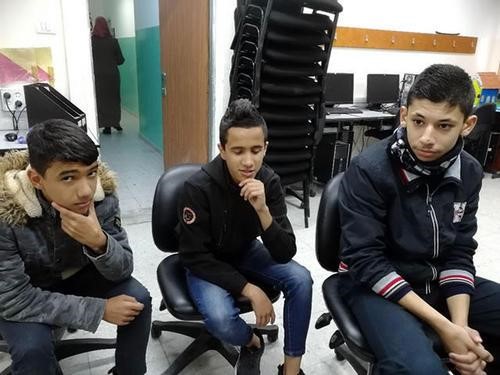
We interviewed the students of the school health committee. They were very mature at the age of 14.
This school is a famous public school where students come both from inside and outside the separation wall. Many of them have to pass through checkpoints before arriving at school. This makes it difficult for them to go to school every day. Soldiers sometimes harass them simply because they are Arabs. If something happens around their resident areas or school, they can’t go back home and have to stay at school for a few hours.
They have many difficulties in their daily life like this, but they say that they have had changes in their lives because of the training. We will report on their further changes as much as we can.
A Japanese person who lives in Jerusalem visited the school with us as a volunteer. The following is her feedback on the school visit.
“I participated in the monitoring of the project that JVC conducted in Jerusalem together with Ms. Yamamura. We visited one of the schools of the project, which was a public boys’ school near the old city. Students from Grade 2 to Grade 9 study together at here. JVC provides training for the students of the health committee. They learn about healthy living and emergency treatment. After the training, the students and local people cooperate in solving health problems in their community. The purpose of the project is not only to aid students in solving health problems, but also in growing their self-esteem. Palestinian people are living in a harsh environment. Israel restricts the areas of their daily activities. Soldiers sometimes do physical examinations. It is common to hear that someone is detained. Due to this terrible environment, children have difficulty with self-esteem and lose the importance to work hard.”
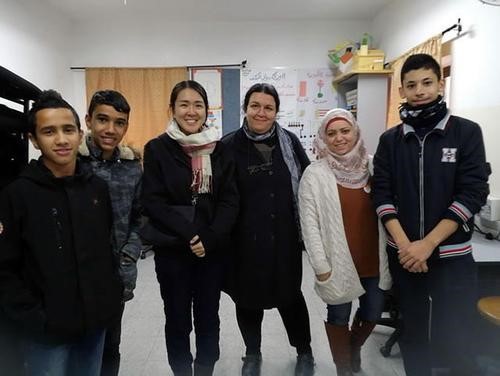
Students of the school health committee, their IT teacher, and Asmaa.
“Ms. Yamamura told us that international politics underlie these problems. It’s not easy to find any improvement for this situation, but she hopes that at least the situation for the children will not get worse. She wants to help children have positive experiences as much as possible. She was so sincere and dedicated to her job. Some students come to school through checkpoints every day. It takes one and half hour or more. They frequently have troubles at the checkpoints. Nevertheless, the students whom we interviewed were very positive and actively asked questions to the teacher.”
“The students were very eager to listen to the lesson on nutrition that the project coordinator gave. The coordinator taught them, for instance, that fizzy drinks had a lot of sugar. The lesson was very practical and easy to understand. Whenever we visited classrooms, the students waved and asked us to shake hands. They were very friendly, but we have to know that they live a difficult life that we can never imagine in Japan. I learned how they live here and how meaningful it is to conduct the project in such a situation.”
Share This: